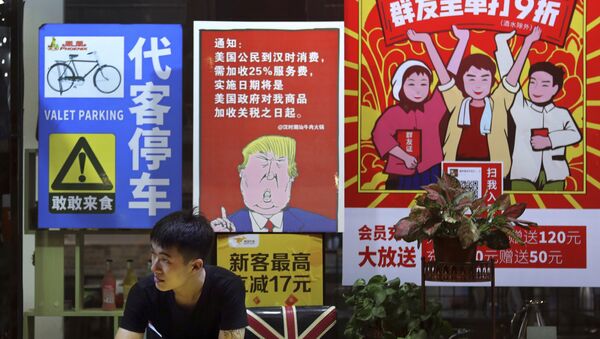US President Donald Trump told reporters on Saturday that at least 13 percent of companies “are going to be leaving China in the fairly near future” as Washington’s new tariffs on Beijing are due to enter force early next month.
“That's a big thing”, Trump said, adding that “it's going to be much higher because they cannot compete with the tariffs”.
“A lot of companies have left China and a lot more are leaving. And they are not doing well. They are having the worst year they've had, I understand, in 61 years. That's a lot of years,” he noted.
Trump went on to say that the US has “taken in billions and billions of dollars from those tariffs [that were slapped on China]”.
“As it’s starting to come out, if you look at the Chinese government, what they’ve done with tariffs is very interesting. They've devalued their currency so much, which hurts them ultimately. It costs them much more to buy things outside of China,” Trump argued.
He was referring to the situation earlier this month when the Chinese currency dropped to its lowest-ever level, breaching the seven yuan-per-dollar threshold during volatile trading amid concerns of an escalation in the trade dispute with the United States. At the time, Trump slammed China's step to devalue the yuan as “currency manipulation”.
Trump Vows Continuation of US-China Trade Talks
During the Saturday meeting with reporters, the US President at the same time made it clear that the trade talks between Washington and Beijing slated for September would not be cancelled.
“Meetings are scheduled. Calls are being made. I guess the meeting in September continues to be on. It hasn't been cancelled. And we'll see what happens,” Trump pointed out.
He also claimed the tariffs will make it easier for Washington to conduct negotiations with Beijing.
“I say that to China directly. And it's only going to get worse for China. Because of the tariffs, we're in an incredible negotiating position, and we happen to be taking in billions and billions and billions of dollars. And we haven't taken in 10 cents from China,” Trump said.
During the G7 summit in the French city of Biarritz late last week, Trump said that US companies should leave China if Washington fails to clinch a trade deal with Beijing, adding that they could stay if the two sides came to an agreement.
US-China Trade Dispute Escalates Further
His remarks came amid the ongoing US-China trade spat, which escalated late last week when Trump announced that Washington would raise the existing tariffs on $250 billion worth of Chinese goods from 25 percent to 30 percent as of 1 October. In addition, US levies would be raised from 10 percent to 15 percent on another $300 billion worth of Chinese goods starting on 1 September.
The move came in response to the Chinese State Council’s announcement that tariffs ranging from 5 to 10 percent would be applied to $75 billion worth of US goods, with some taking effect on 1 September and others on 15 December. Also, a 25-percent duty will be introduced on US cars.
The Chinese-US trade row began in mid-2018, when Trump announced tariffs on $50 billion worth of Chinese imports to help fix a $400 billion trade deficit that he claimed was caused by China’s “unfair trade practices.”
Along with the import duties, the US moved to blacklist the Chinese tech giant Huawei, accusing the company of installing “backdoor” access in its devices to help Chinese intelligence services spy on users worldwide. Both Huawei and Beijing vehemently reject the allegations.




